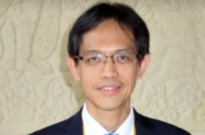
当地时间3月5日7:30,第29届亚太肝病学会年会(APASL2020)“自身免疫性肝病专题研讨会”于印度尼西亚巴厘岛如期举行,会上报告了自身免疫性肝炎(AIH)、原发性胆汁性胆管炎(PBC)和原发性硬化性胆管炎(PSC)的最新学术进展。
印度尼西亚大学Dr. Cipto Mangunkusumo综合医院肝胆疾病科C. Rinaldi A. Lesmana教授介绍了肝硬化和无肝硬化AIH患者的管理,《国际肝病》前方记者就相关问题采访了Lesmana教授,访谈内容记录如下。
C. Rinaldi A. Lesmana
印度尼西亚大学
tips:收听英文可以滑动文章学习英文呦!
1自身免疫性肝炎患者逐渐增多需密切关注
1.患病人数有上升趋势
与其他肝脏疾病类似,自身免疫性肝炎(AIH)也是由细胞因子引起的炎症。从基因角度,对于亚洲人和南亚人,自身免疫性肝炎是一种非常罕见的疾病。目前虽然不清楚确切的发病率,但在临床实践中患者人数正逐渐上升。
在印度尼西亚该疾病同样非常罕见,但随着自身免疫性肝炎患者的增多,研究者对于药物(使用抗生素或草药补品)引起疾病的作用越来越关注。在印度尼西亚、印度和中国等国家/地区,日常生活中经常使用草药补品,但尚不确定其作用。随着发病率的增加,这情况已引起研究者的密切关切。
2.根据需求选择肝活检或无创评估
自身免疫性肝炎的评估困难,通常需要进行肝脏活检。但由于肝脏活检的有创性,因此对大多数人采用非侵入性方式(例如FibroScan)评估疾病的严重程度。
但是,在开展自身免疫性肝炎治疗之前,需经过肝脏活检确定诊断。同时,在患者的监测和随访中已将非侵入性方式作为评估肝脏纤维化改善情况的方法。
原文呈现:
<Hepatology Digest>: How do you assess the severity of autoimmune hepatitis in routine clinical practice?
Dr Lesmana: Autoimmune hepatitis is quite a rare disease in Indonesia. It is not easy to assess, and usually we need to use liver biopsy. For most people, performing liver biopsy is a problem, so we assess severity using non-invasive assessment such as FibroScan. However, a liver biopsy will show with certainty that the diagnosis is correct prior to initiating treatment for autoimmune hepatitis. For monitoring and follow-up, looking at liver fibrosis improvement as a non-invasive assessment is done.
<Hepatology Digest>: What is the mechanism of autoimmune hepatitis?
Dr Lesmana: The mechanism is similar to other liver diseases, with cytokines causing inflammation. But one thing we are still curious about with the increase in autoimmune hepatitis in our country is the role of drug-induced disease (due to antibiotics or herbal supplements). In countries like Indonesia, India and China, herbal supplements are often used in daily life. We are unsure of the role, but with incidences increasing, we are concerned. Genetically, it is a very rare disease for Asian and South Asian populations. Currently, we don’t know the exact prevalence, but in my clinical practice, it is increasing.
治疗进展:类固醇疗法给AIH失代偿期肝硬化患者带来希望自身免疫性肝炎的治疗目前仍然采用基于类固醇的疗法,有时会与其他免疫抑制剂联合使用,以减少类固醇的长期副作用。该方法通常效果良好,但是仍有部分患者进展为肝硬化。
根据Lesmana等人的小型研究经验,即使自身免疫性肝病患者诊断合并有肝硬化后,一旦接受低剂量的类固醇治疗,也有改善的趋势。
在失代偿性肝硬化患者中同样有效,患者的腹水和胆红素水平有所改善。虽然在研究中这只是一小部分患者,但依然给失代偿性肝硬化患者带来了希望。
原文呈现:
<Hepatology Digest>: Can you talk about progress in the treatment of autoimmune hepatitis?
Dr Lesmana: We still use steroid-based treatment, sometimes in combination with other immunosuppressants, to reduce the side effects of the steroids in the longer term. In our experience, results are quite good, but there are still some patients who progress to liver cirrhosis. In our small study experience, we can show that even patients with liver cirrhosis due to autoimmune disease tend to see improvements once diagnosed, even with decompensated liver cirrhosis, when treated with low-dose steroids. They see improvement in ascites and bilirubin levels. It is only a small number of patients in our study, but it has been an opportunity to show that even in patients with decompensated liver cirrhosis, it is useful to use standard basic steroid therapy.
互相支持,不放弃,像平时一样尽力前行
Lesmana博士对中国发生的疫情深表遗憾,表示这已不再是限于中国的问题,作为医生,现在是每个人的问题,在解决这些问题时不要放弃。而且,我们还需要解决许多其他严重的疾病,例如在印度尼西亚,登革热的病死率非常高。所以,要把这些当作生活的一部分,必须像往常一样尽力地前行。
同时,因为疫情原因,中国和其他地区的一些专家无法出席现场会议,举办者一直努力建立国家之间的电话会议。目前已与新加坡、日本和印度举行了电话会议,可以进行双向互动。此外,在重要专题会议期间,将以电话会议的形式邀请中国医生加入。
Lesmana博士还对出席会议的各国专家提供的支持表示感谢。大家互相支持,相互欣赏,希望每一位希望做出贡献的人都能够参与进来,团结起来。
原文呈现:
<Hepatology Digest>: Hepatology Digest is a Chinese journal, and, of course, our Chinese hepatologists are not attending this meeting. What has the meeting done to try to accommodate those who cannot be here in Indonesia?
Dr Lesmana: We have been quite desperate, because it is not just the Chinese faculty who have been unable to attend, but other countries facing similar issues with travel, such as South Korea and Japan. Over the last two weeks, we have been working hard to set up teleconferencing between countries. Today, we have already had a teleconference with Singapore, Japan and India, which allows for two-way interactions. During the main symposium, there will be a session for the Chinese doctors where there will be a teleconference presentation involving members of the invited faculty.
<Hepatology Digest>: If you could address our Chinese hepatologists, what words of encouragement would you give to them?
Dr Lesmana: Firstly, I would share my deep regret for events in China. Secondly, as this is now no longer a China-only issue, and because we are all doctors in our respective societies, this is now everybody’s problem. I encourage them not to give up when tackling these problems. We have many other severe diseases we need to address as well. In Indonesia, the case fatality rate of dengue fever is still higher than that of the coronavirus. That is part of our lives. We have to move forward doing our job as usual and as best we can. I am surprised today to see faculty members from Japan, Turkey, the Philippines, European countries, and the United States in attendance, and they are here to support this meeting. We are all friends and try to support each other. We understand the underlying conditions, and appreciate each other, and aim to accommodate everyone who wishes to contribute.